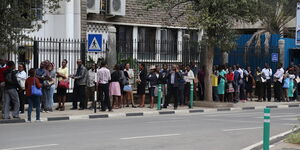Working in Nairobi County or any other county demands more than just offsetting bills, shopping and paying for other tertiary needs like school fees.
Saving is the order of the day as emergencies are always popping up. A bunch of notes on a rainy day can offer relief from shylocks, mobile loans and borrowing from friends.
One of the easiest ways to save is to cut on costs, especially if one has the tendency to work with a fixed budget and those who focus on the nitty-gritty financial aspects.
When budgeting, house shopping is among the key priorities and when doing this, you have to draw a line between the essentials and items that are extravagant.
Wholesale purchase
Most Nairobians are leaning towards purchasing items from wholesale stores as opposed to supermarkets where most goods have been divided to suit customers who purchase items on a small scale.
For example 1 kg of rice or 2 kg of sugar. However, wholesale shops offer items on large scale and at a cheaper cost.
"One can find a wholesale shop in any town where retailers also purchase their goods. You can then purchase items in bulk at a cheaper cost," Emmanuel Githuku, a digital strategist and entrepreneur says while speaking with Kenyans.co.ke.
Some of the wholesale shops can be found at Kamukunji, Nairobi and areas around Gikomba Market. Here one can even purchase other household commodities at cheaper prices. These areas are also frequented by new mothers in search of cheap quality diapers.
Group bulk purchases
Githuku adds that bulk purchases offer the best relief, especially when a group of five join hands. Most people refer to such teams as chamas or youth groups.
However, neighbours too can pick such trends or families who stay in the same county can buy on bulk and share with each other.
"Instead of buying five litres between Ksh 550 and Ksh 700 in a supermarket, a group can purchase 20 litres from wholesale at around Ksh 2000 to Ksh 2300. This means one person can save around Ksh 100 to Ksh 200 when you divide the total cost per the contributors after wholesale purchase," he stated,
The same applies to other commodities for example, instead of purchasing rice at Ksh 120 per kg, five can buy 25kgs at between Ksh 2,000 and Ksh 2,250 from wholesale, amounting to Ksh 90 per kg.
Digital platforms.
With digital transformation, many Kenyans are taking their businesses online. These platforms can even deliver goods at doorsteps.
Most of them offer discounts on certain days and Nairobians are seizing the opportunity to buy in bulk during offer hours.
Discounts can be offered by around 20% to around 50%.
Coupons and Loyalty Programs
These are for those who frequent supermarkets. Many customers usually get offers to pick cards that accrue loyalty after each shopping session.
The points can be redeemed once they accumulate to a certain level. Other supermarkets also offer discount cards.
Loyalty programs are strategic marketing concepts designed to retain existing customers through various rewards exclusive to members, while at the same time attracting new customers.












